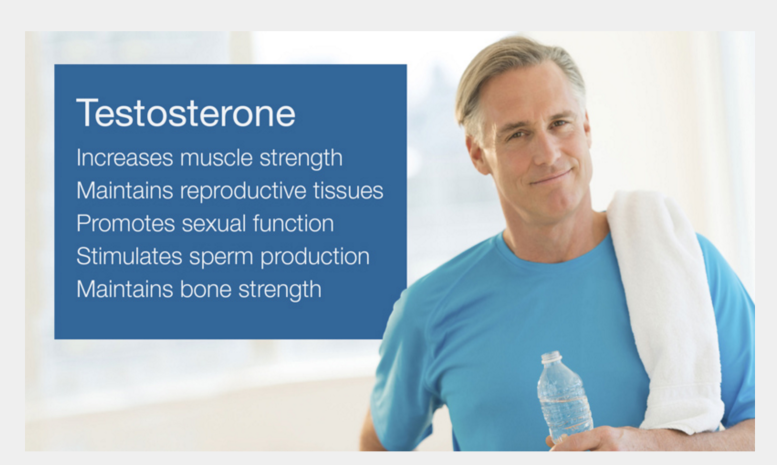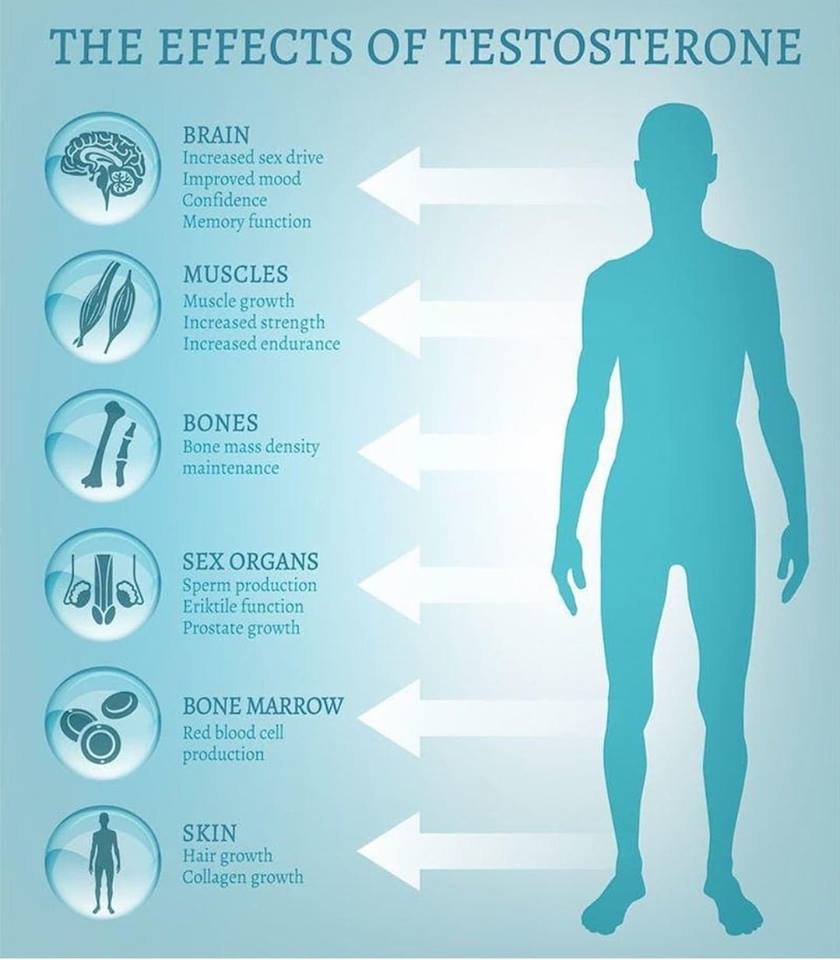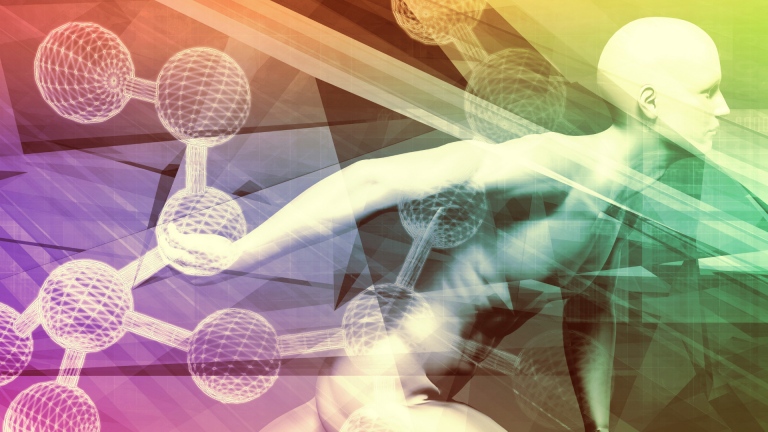The 6 Effects of Testosterone in Your Body 6 Effects of Testosterone in Your Body, However, the body changes as we age and loses some of its regenerative capacity. A fundamental part of this decline stems from a slow-down in hormonal secretions. Simply put, even young people with glandular issues who do not produce enough testosterone and HGH experience side effects and disorders usually only associated with much older individuals. Conversely, naturally or via hormone replacement therapy, older patients with higher hormone levels have health benefits generally associated with younger individuals.
Also, Women Can Be at Risk for Low Testosterone:
The ovaries produce both testosterone and estrogen; as they age, they have less estrogen and testosterone. As women enter peri-menopause and pre-menopause, testosterone will be diminished by the age of the ’30s. Once a women reach full menopause, it’s common for them to produce 75% less testosterone than they did in the there 21s. Every woman becomes at risk of low testosterone as she ages, and women who go through hysterectomy or oophorectomy have an even higher chance of dealing with or having low testosterone in women levels.
Changes the Brain:
Research has shown that women have a significant advantage in a few things, Like memory and language, while men tend to have more vital spatial skills (though this, too, has been disputed). But due to ethical restrictions, no study has been able to track the direct effect of testosterone exposure on the brain—until now.
The hormone also affects your state of mind, including how well your brain works. Low testosterone has been linked to mood swings, increased stress, and depression. “Cells in the brain have testosterone receptors, and low testosterone in those receptors significantly affects mental health.”
Muscle and Strength:
Recent studies have shown that men, as they age, lose more muscle mass than women of the same period, and this has led researchers to believe that the loss of muscle strength and has it has a direct link to the predominantly male decline hormone, like testosterone.
Testosterone helps to build muscle mass and strength in young men.
Testosterone supplementation in men increases fat-free mass, but whether measures of muscle performance, such as maximal voluntary strength, power, fatigability, or specific tension, are improved has not been determined. …
A seated leg press exercise defines maximal voluntary muscle strength and fatigability.
Bone Density and Osteoporosis:
As men age, their serum testosterone concentrations and bone densities decrease. Because bone density is also low in hypogonadal men, we hypothesized that increasing the serum testosterone concentrations of men over 65 yr to those found in young men would raise their bone densities.
Testosterone increases levels of growth hormone. That makes the exercise more likely to build muscle. Testosterone increases bone density and tells the bone marrow to manufacture red blood cells. Dropping the levels of testosterone can cause an increase in body fat.
Sex Drive and Libido:
Some men maintain sexual desire at a relatively low testosterone level. For other men, libido may lag even with normal testosterone levels, and low testosterone is one of the possible causes of common desire and sex drive, however.
If testosterone has lowered far enough, virtually all men will experience some decline in sex drive. Growth hormone (GH) has also been used to reverse or correct erectile dysfunction and other sexually impending disorders, primarily by improving circulation and blood flow, resulting in a firmer, more sustainable erection.
Bone Marrow and Red Blood Cells:
Erythropoiesis affects the production of new red blood cells. One is accomplished primarily in the bone marrow, the red blood cell factory. Erythropoiesis is stimulated mainly by erythropoietin (hence, the clever naming of that hormone!). …
Androgens, including testosterone, are another type of hormone. Testosterone and other androgens have an erythropoietic stimulating effect that can cause polycythemia, manifesting as an increase in hemoglobin, hematocrit, or red blood cell count. …
If hematocrit is elevated before starting testosterone, the cause should determine before beginning androgen therapy.
Skin and Collagen:
A man or woman with shrinking testosterone levels may lose some body hair. Testosterone replacement therapy has potential side effects, including acne and breast enlargement.
Testosterone patches may cause minor skin irritation. Research now suggests that bioidentical hormone replacement therapy (or BHRT) can actually reverse many of the signs of aging and that you may have come to accept – weight gain, low libido, reduced muscle mass – and can even help to prevent conditions such as osteoporosis, heart disease, and dementia.
Testosterone Replacement Therapy
Testosterone is stimulated and produced by the testes and is critical to driving male sexual behavior. Although testosterone is a sex hormone, it plays many crucial roles. It regulates a man’s sex drive (libido), bone and muscle mass, fat distribution and the production of red blood cells, Decreased libido, and sperm. The body begins to produce testosterone as early as seven weeks after conception, with levels reaching their peak at puberty.
As men age, testosterone levels start to drop, affecting individuals differently.
Decreased Motivation:
As testosterone production diminishes, so do energy-boosting components and restful sleep, thus producing decreased motivation.
Decreased libido:
Low levels of testosterone cause a reduction in sex drive.
Depression:
When a person experiences low testosterone levels, it alters hormone production, which can lead to depression.
Erectile Dysfunction:
Testosterone supplementation can be used to reverse or correct low testosterone-induced erectile dysfunction.
Fatigue:
A decrease in testosterone levels leads to hormonal changes, which can cause fatigue. Low testosterone-induced sleep loss can exacerbate this, quickly becoming a vicious cycle.
High Cholesterol:
High cholesterol is a silent killer that can lead to various heart conditions. Testosterone injections, used in a proper protocol, can lower cholesterol, blood pressure, and triglyceride levels.
Low Energy & Fatigue:
Symptoms of aging can directly result from diminishing levels of testosterone or (Low-T) in the body. As we age, our bodies produce less and less testosterone, causing low energy and fatigue.
Memory Loss:
Some recent evidence suggests that testosterone might help prevent and treat the effects of brain aging. Some patients treated with testosterone injections expressed a palpable increase in their cognitive function, short- and long-term memory, and vocabulary improvements.
Thyroid:
The hormones produced by the thyroid and adrenal glands regulate vital processes throughout the body. If thyroid hormone and cortisol levels are abnormal, the rest of the body does not function properly.
Weight Gain:
The production of certain hormones decreases after the age of 30. The lean body mass of some organs also starts to drop, whereas fat mass increases.
**NOTE** The content in this blog is subject to interpretation and is the opinion of the content writer. We do not claim it to be fact. We encourage you to consult a medical doctor before taking any prescribed medications or supplements.
Conclusion
Supporting Hormones health is essential for overall well-being and vitality. By incorporating regular exercise, proper nutrition, adequate sleep, stress management techniques, and IV therapy, you can help maintain optimal testosterone levels and lead a healthy, balanced life. Always consult a healthcare professional before making significant changes to your lifestyle or starting any new treatments to ensure they suit your needs.
At AAI Rejuvenation Clinic, we advise anyone to think seriously about beginning Hormone treatment if there is no medical need for it. However, we will take every precaution to ensure that you read your program’s positive benefits by providing the latest at-home hormonal mouth-swab testing to ensure we are continually monitoring your progress and aware of any adverse side effects. Fill out the Medical History Form, or if you need more information, call us at (866) 224-5698 or (866) AAI-Low-T.
Low Hormone Symptoms
- Motivation
- Sex Drive and Desire
- Depression
- Fatigue
- Erectile Dysfunction
- Cholesterol
- Low Energy
- Memory Loss
- Osteoporosis
- Wounds & Illness
- Muscle Mass
- Sleep Disturbances
- Thyroid Dysfunction
- Weight Gain
]]>





